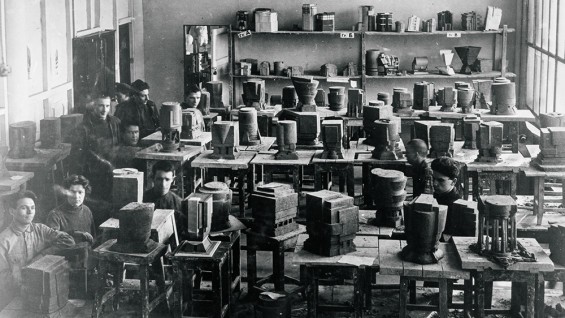Vkhutemas
This exhibition examines the history of Vkhutemas, an interdisciplinary design school often referred to as the “Soviet Bauhaus.” As an educational experiment of unprecedented scale and complexity, Vkhutemas—an acronym for the Higher Art and Technical Studios—translated radical experiments in art, architecture, and design into a systematized pedagogy. From its inception, the school’s foundational curriculum sought to develop universal teaching methods based on scientific discoveries and artistic experimentation.
Founded in 1920, Vkhutemas served as a platform for institutionalizing the avant-garde and constructing a new mass culture. The school was the first major attempt to democratize design education by making it accessible to formerly disenfranchised social classes. Students were not charged tuition, enabling those from working-class backgrounds to access higher design education. Accused of “formalism” by Joseph Stalin’s government, the school was shut down in 1930, after only a decade, and due to a variety of circumstances it remained largely lost to history.
This exhibition, which is the result of two Cooper Union seminar courses and a workshop on Vkhutemas taught by adjunct professor Anna Bokov, Ph.D., aims to resituate this still little-known school and its vast pedagogical legacy within the history of modern art and architecture. Bokov’s recent book, Avant-Garde as Method: Vkhutemas and the Pedagogy of Space, 1920-1930 (Zurich: Park Books, 2020), is the first systematic English language study of the school’s history and the source material for her courses at Cooper Union.
Vkhutemas: Laboratory of the Avant-Garde, 1920-1930 features the work of twenty-seven current and recent Cooper Union architecture students as they explore the modernist work of early 20th century Vkhutemas students.
